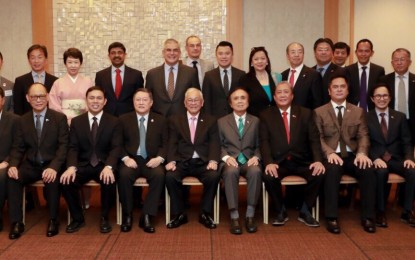
DUTERTE CABINET IN TOKYO. Cabinet members of the Duterte administration and top officials of the Japanese government pose for a photo during the Philippine Economic Briefing in Tokyo, Japan on June 19, 2018. The Philippine government's economic team discusses ways of expediting the administration's flasghip infrastructure programs and briefs investors on prospects for the Philippine economy. (Photo courtesy of Sec. Martin Andanar)
MANILA – The Duterte administration's top economic managers are vigorously courting Japanese businessmen to take part in the country's massive infrastructure push as well as in its vibrant manufacturing sector amid an economy that is growing by leaps and bounds.
In his speech during the Philippine Economic Briefing at the Imperial Hotel in Tokyo Tuesday, Finance Secretary Carlos Dominguez III made his pitch before some 600 potential investors and ranking Japanese government officials in attendance.
Japanese companies can look into participating in the “Build, Build, Build” program of the government, following Japan International Cooperation Agency’s (JICA) confidence to fund infrastructure projects in Luzon through loan agreements, Dominguez said.
These big-ticket infrastructure projects funded by JICA include the Cavite Industrial Area Flood Risk Management Project for flood mitigation in several areas in Cavite, where most of the economic zones are located; Arterial Road Bypass Project Phase III that will ease traffic congestion in Bulacan and spur economic growth in provinces north of Metro Manila; and Metro Manila Subway Project Phase I, the first underground rail system in the country.
“As we modernize our infrastructure and accelerate our growth, we look forward to increased investment flows from Japanese companies,” Dominguez said.
Japanese firms can also take advantage of the strengthening of the country’s manufacturing sector, which is one of the biggest contributors to the gross domestic product (GDP) expansion.


The finance chief said the 8-percent growth of the manufacturing sector in the first quarter of 2018 has backed the 6.8-percent GDP growth in the same period.
He likewise cited various reforms that the administration is undertaking to make the local business environment more favorable to investors.
“We are reviewing our foreign investments negative list to open more areas for joint ventures and direct investments. We are constantly reviewing our procedures to reduce red tape and shorten approval time for business start-ups,” Dominguez added.
Just last month, the country has enacted into law the Ease of Doing Business and Efficient Government Service Delivery Act of 2018 that will streamline and fast-track transactions for business operations in the government both in national and local levels.
“On our part, we commit to further improve the ease of doing business, respect the sanctity of contracts, and promote a more conducive climate for investments,” he said.
Moreover, Dominguez said the government plans to issue a USD1-billion Samurai bonds this year to support
The yen-denominated bonds is expected to be offered in the second half of the year.
Earlier, Deputy National Treasurer Erwin Sta. Ana said the Monetary Board has already approved the issuance of the Samurai bonds, and the Bureau of Treasury is waiting for the Special Authority from President Rodrigo Duterte.
For this year alone, the government has issued USD2-billion 10-year global bonds in January and 1.46-billion renminbi Panda bonds in March.

Meanwhile, this issuance of government bonds is in line with the administration’s financing program for this year that intends to increase its borrowings from foreign sources.
In the same event, Budget and Management Secretary Benjamin Diokno said 2018 will be the year that the Duterte administration will hike the share of foreign borrowings.
Diokno said the share of borrowings from foreign sources this year will be at 35 percent, from last year’s 19 percent, before it will be slowed down to 25 percent from 2019 until the end of the Duterte administration in 2022.
A Philippine delegation is in Japan for a no-deal roadshow to pitch the Samurai bonds offering and invite Japanese firms to participate in the infrastructure projects in the country.
The government delegation is composed of Dominguez, Diokno, Socioeconomic Planning Secretary Ernesto Pernia, Transportation Secretary Arthur Tugade, Public Works and Highways Secretary Mark Villar, Bangko Sentral ng Pilipinas Governor Nestor Espenilla Jr., Bases Conversion and Development Authority President and Chief Executive Officer Vivencio Dizon, and Presidential Communications Secretary Martin Andanar.
Filipino tycoons who took part in the Japan roadshow include Jaime Augusto Zobel de Ayala, Manny Villar, Metrobank's Alfred Ty, and Megaworld's Kevin Tan. (PNA)
